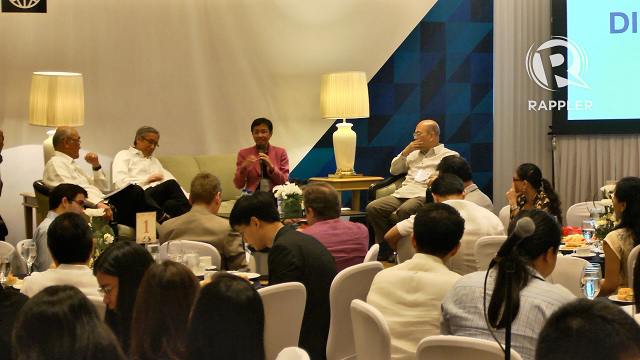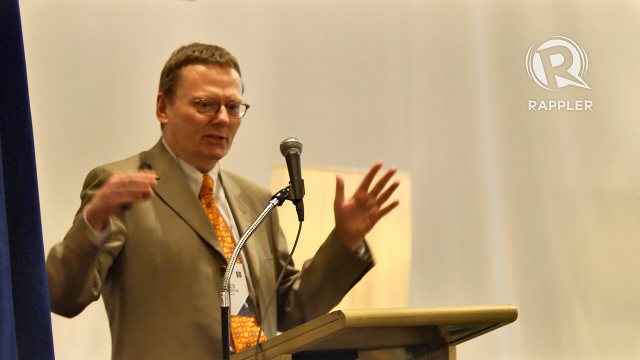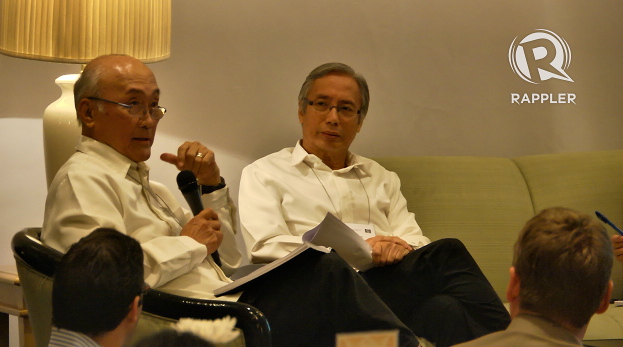SUMMARY
This is AI generated summarization, which may have errors. For context, always refer to the full article.

MANILA, Philippines – Over the past few decades, the economies of Singapore, China and South Korea all experienced rapid growth. One thing they all had in common was strong central leadership.
Lee Kuan Yew was Singapore’s prime minister for 31 years, Park Chung-hee headed South Korea for 16, and the Chinese Communist Party took power 63 years ago and still holds it today.
So could having a more authoritarian government also benefit the Philippine economy? That was one of the questions Philippine economists tossed around with the co-author of “Why Nations Fail,” James Robinson, at a Thursday, December 6 forum.
According to Robinson, the answer is no. He said the Philippines is not suited to a “developmental dictatorship.” But not all the Filipino economists at the forum agreed.

The economists were picking apart a central premise of Robinson’s book — that countries which take off economically have inclusive systems where power is shared, politicians are checked, and markets are fair. They pointed to China, Singapore and South Korea as examples of countries which were not inclusive and grew anyway.
But Robinson explained that the Philippines is different from those countries and not fit for a beneficial form of dictatorship because its institutions are not as inherently efficient.
Ferdinand Marcos ruled the Philippines for 20 years, during which time he seized some private businesses, acquired several prime New York properties and was thought to have plundered more than US$100 million from the Philippine Treasury.
Ultimately the country took a divergent economic path from asian countries like South Korea, which according to 2011 estimates, has a per capita income of $31,200 compared to the Philippines’ $4,100.
“If you think of the roots of South Korean bureaucratic competence, that’s something deeply rooted in this Chinese model of bureaucracy, the examination system. This goes back much further than colonization,” Robinson told Rappler.
“If you think of the nature of precolonial society of the Philippines, it looks nothing like Japan, Korea or China. So that’s why you got stuck with Marcos and not President Park,” he said.
Robinson stressed that the state and society were formed under different influences in South Korea and the Philippines.
“President Park was able to implement these policies…because he inherited a very efficient bureaucratic state. The state had a very different history than the Philippine state. That’s important for understanding what sort of options are available,” he added.
Developmental dictators in Asia
Robinson sees developmental dictatorships as uniquely Asian and doesn’t think having power so centralized will be profitable in the long run.
“This business of developmental dictatorship, this is a phenomenon which is completely restricted to parts of Asia,” Robinson told Rappler during the December 6 edition of “Talk Thursday.”
“There has never been a developmental dictator in Africa. There’s never been a developmental dictator in Latin America. And why is it so difficult to have a developmental dictator in the Philippines? Because the Philippines is much more historically like a Latin American country than a South Korea, a Singapore or Japan,” he added.
“When we look at many experiences of this we see it’s not a sustainable way to have a prosperous society. And I would say if you’re thinking of the Philippines, and the relevance of that path for the Philippines, this is also not a path that is feasible in many other countries.”
In a later interview with “Business Nightly,” he hypothesized that in China’s case the economic dynamism could eventually prove so threatening that it would “come to a halt” or create “a destabilizing political conflict.”
But one local economist is unsure that more centralized power is not needed by the Philippines.
Economic benefits of dictatorship?
The history of martial law often varies, depending on who is doing the telling. Economists even now debate the economic benefits of such centralized leadership.
Renowned Filipino economist Gerardo Sicat told Rappler that the President could benefit from having more power. He believes that the political process today can lead to “gridlock,” slowing down the implementation of necessary policies.
“Well this period is probably somewhat different in the sense that the system finds it difficult to pass a lot of laws quickly….One problem we might have is the situation where it’s so hard to get to second base for some of the laws,” he said.
The local legislative process can be painfully slow. Bills seeking to introduce reproductive health safeguards and revise excise taxes on the so-called sin products of tobacco and alcohol have languished in the legislature for more than a decade.
Though President Aquino has the power to certify the bills as urgent, these still have to overcome political hurdles in the Senate and House of Representatives. Still because there are checks on the legislative process, the Supreme Court can suspend laws that are found to violate citizens’ rights, as it did with the Cybercrime Prevention Act of 2012.
Sicat, who was head of the National Economic Development Authority under Marcos, also pointed out that the former head of state was able to successfully push for needed infrastructure that fueled the economy.
Marcos undertook massive infrastructure programs, though largely with the help of development loans. A 2002 study by the Philippine Institute for Development Studies showed that he built more roads than the 4 succeeding presidents combined, and on an annual basis, followed President Fidel V Ramos for average kilometers of road built per year.

Bangko Sentral ng Pilipinas monetary board member Felipe Medalla argued that despite the massive infrastructure development under Marcos, it does not pay economically to have an authoritarian leader.
He acknowledged, “Marcos’ government was much better in infrastructure than the governments that followed it. The big problem when government has a short time horizon, (is that) it cannot do infrastructure well. And typically elected politicians with a 3-year term cannot think long-term. So in that sense Marcos was superior to current arrangement.”
“On the other hand, a kleptocrat can do more damage than even our current crazy set of politicians, as shown by the fact that Marcos destroyed the PNB (Philippine National Bank), DBP (Development Bank of the Philippines), and even the old central bank. So the other side of it is that power corrupts and absolute power corrupts absolutely,” he said.
Several of the economists at the forum agreed that the transition out of martial law was problematic. They explained that the weak institutions put up in reaction to Martial Law are holding back the country today.
“The problem with the local government code is that it is a reaction to Marcos…And now it is so hard to reverse,” said Medalla.
“The worst feature of the code it that local governments get a 40% share of the internal revenue collection of 3 years ago and there is little accountability.” He added that poor local governance has led to bad national governance.
“The disconnect between who taxes and who spends is creating problems of accountability,” said Medalla.
So what now?
Handicapped by historically weak institutions, what should the Philippines do now? Robinson said the President should focus on institution-building.
“I think the lesson that I would draw, and not pretending to be an expert, is that you have to keep trying to build the inclusive institutions. You have to try to build this road that was started on after 1986, but in some sense got derailed,” he said.
“It’s just the job was only half done in 1986 so now you have to go the whole way,” Robinson added.
He said he sees President Aquino as a leader who is trying to follow in his mother’s and father’s footsteps and “deliver on those promises” of People Power.
But one participant cynically joked, what happens after Aquino steps down and Vice President Jejomar Binay steps up?
“My view is that if the president spends the next 3 years obsessed with institutions, it will not matter who the next leader is,” Robinson said.
“Leaders can be accidental but I think once the right leader comes [in he should] focus on institution-building. That [should be] more or less his obsession,” he added.
He added that the old elite that came into power after Martial Law were still bogarting economic opportunities and holding the country back. But he pointed out that the public now has more tools at its disposable for holding institutions accountable.
He explained that the public can now “build a coalition” through social media and the news. “That’s something in which the media, social media, other types of media, can play a huge role in making the political system more accountable, in trying to show people what’s at stake from the present system and how things could be organized differently,” he said.
“At the end of the day most Filipinos suffer from this system. This is not a system that benefits the majority of people in this society. So it’s just a matter of the majority of people understanding their predicament. If you can achieve that then you will have change,” said Robinson. – Rappler.com
Add a comment
How does this make you feel?
There are no comments yet. Add your comment to start the conversation.